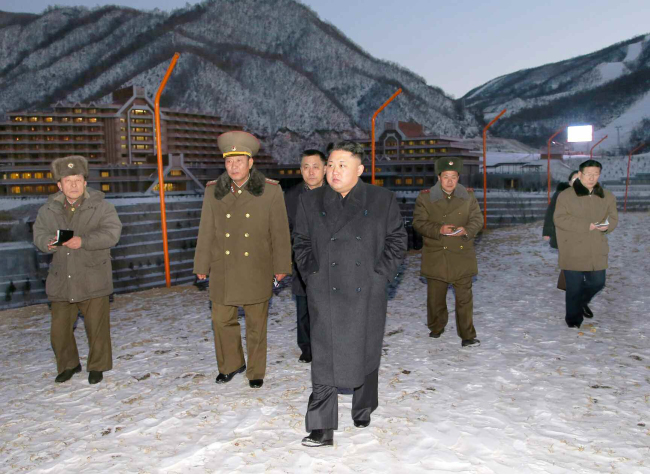Latest developments point to instability in N. Korea
Economic failures could increase chance of instability: experts
By Korea HeraldPublished : Dec. 15, 2013 - 20:04

North Korean leader Kim Jong-un’s reinforced reign of terror is further increasing uncertainty over the long-term political and economic stability of the reclusive regime, analysts said Sunday.
Continuous purges and executions of officials, political and financial rewards to stalwart followers and a massive national campaign to idolize the dynastic ruler have made Kim’s leadership seemingly stable.
But observers questioned the long-term viability of his iron-fisted rule, which could erode public support and stifle voices and creative ideas for reform, openness and better ties with the outside world.
“Kim’s leadership is not unstable for now, as he is strengthening discipline among elites and rewarding loyalists by offering them state citations and higher positions, which were left vacant after purges and executions,” said Huh Moon-young, a senior fellow at the state-run Korea Institute for National Unification.
“But for the long-term outlook, uncertainty grows. With external relations deadlocked, the economy would continue to deteriorate, which would worsen discontent among regular people, soldiers and middle-level officials.”
The recent executions of senior officials including his so-called guardians, such as Kim’s once-powerful uncle Jang Song-thaek, have created a climate of fear, which calls for absolute obedience to the dictator.
But these purges could send a message to Kim’s loyalists that they could also be removed. The purges could weaken elites’ trust of the ruler, albeit inexplicitly, and destabilize his leadership in the long run, some analysts said.
Among the seven promising officials who escorted the hearse carrying the body of former leader Kim Jong-il during his funeral in December 2011, only Kim Ki-nam, a secretary of the ruling Workers’ Party, and Choe Tae-bok, the chairman of the Supreme People’s Assembly, remain in power.
The rest have been purged, executed or removed from the political scene. They include former General Staff Chief Ri Yong-ho and U Dong-chuk, first deputy director of the State Security Ministry. Both were removed from the public eye last year.
Choe Ryong-hae, the director of the General Political Bureau of the military, has emerged as the lynchpin of the North’s power echelon. But his fate could also be threatened unexpectedly for disloyalty or involvement in a power struggle.
The biggest challenge to Kim’s leadership may originate from the failure to shore up his country’s debilitated economy. Unless Kim moves to restore ties with China, the South and the U.S., the North’s economic reconstruction would only remain a far-fetched dream, experts say.
The execution of Jang, deemed a relatively dovish reformist, is expected to hamper economic cooperation with China. Jang had built a wide network of Chinese officials and businesspeople while spearheading joint projects with the North’s traditional ally.
The ongoing purges of key economic officials with ties to Jang could further cloud the prospect of enhanced economic relations with China.
“Economic projects with China could face some delays following the removal of Jang and his associates with ties to China. The dismissal of pro-China officials could offend Beijing in a way,” said Huh.
Pyongyang is also unlikely to take any bold steps for the time being to denuclearize and improve ties with Seoul and Washington, as it still prioritizes internal stabilization amid the three-year mourning period for the late leader Kim Jong-il.
Meanwhile, North Korean media have churned out reports over the weekend that justified the execution of Jang. They all praised the decision to execute the “traitor” and called on the people to rally behind Kim.
The North’s official Korean Central News Agency also reported Saturday that the regime conferred citations to some 150 people for their contribution to economic construction.
By Song Sang-ho (sshluck@heraldcorp.com)
-
Articles by Korea Herald









![[Hello India] Hyundai Motor vows to boost 'clean mobility' in India](http://res.heraldm.com/phpwas/restmb_idxmake.php?idx=644&simg=/content/image/2024/04/25/20240425050672_0.jpg&u=)









